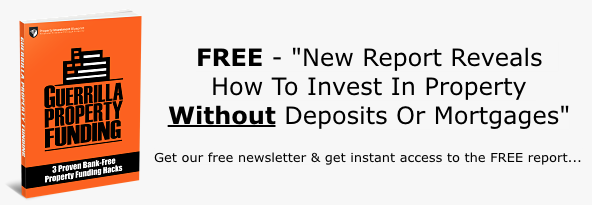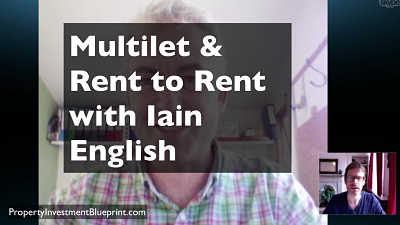
Multilet Interview: Iain English hits back at rent to rent critics
In this interview, multilet expert Iain English gives a measured response to the recent critics of the rent to rent strategy. He also talks about how he got started, shares a clever tip on tenant deposits and announces his forthcoming unique and innovative franchise and training opportunities.
Multilet course
If that has whet your appetite for HMO, our friends Mike and Victoria jumped ship from the corporate world into HMO investing in 2013 and you can get the benefit of their experience in their HMO Course, here.
In this interview
1:18 - How Iain got started (in an unconventional way)2:17 - Turned a difficult situation around with multilet
3:01 - Advice for people starting out
4:34 - One of our lower end deals (hint: it still has giant cashflow)
8:27 - Great tip to avoid having to register tenant deposits
12:10 - Advantages of rent to rent property investing
13:50 - Don't get into it if you're not a _______ person
15:04 - Response to criticisms in the blogosphere
20:05 - Demand for single lets will only increase
20:50 - Ambitious franchise plans announced
22:17 - Raising the bar in the industry.
Video transcript
John: I'm John Wilson and this is PropertyInvestmentBlueprint.com and today I'm excited to welcome one of the rising stars of UK Property Investing, Iain English. Iain has built a very successful business in a relatively short time, based around the multilet and rent to rent strategies. Now Iain came onto my radar a few months ago when I heard an interview that he'd done with Your Property Network Magazine. I was impressed by his value of attention to detail, his strong business sense and we also seem to share a love of putting systems into property businesses. Then when I saw his website, I was impressed by his strong branding ethic that he had there as well. So thanks for your time Iain and welcome to the broadcast.
Iain: That was a really nice introduction John! Thank you for that.
John: No, it’s OK! So just for the benefit of the listeners, talk a little bit about how you got started. I know it was in a slightly unconventional way.
Iain: Ya! I think that's perfectly fair to say actually. I guess that “Necessity is the mother of invention” and I had a fairly catastrophic business collapse. It left me with just over £150,000 worth of debt and I still had to pay the mortgage on my own property. My son was living with me and I probably consider myself unemployable having always been running my own companies. And you know I was really looking at a bit of a dark future at that point in time. Then I rented a room out in my property which as you know I'm based in Tunbridge Wells, first I didn’t think too much of it – Thought that 350 quid would be helpful but it wasn’t going to change much.
But then I rented out another room in the house and realised that it was starting to make a bit of difference. It kind of went from there really and we now have 5 people/ lodgers staying with us. But it showed me how quickly things could be turned around and of course the cash flow was the bit which was my mercy, and it very quickly led me to start looking at how I could use the same sort of technique to really generate a good future for myself, which is really the next chapter in the story.
John: That’s fantastic! I often recommend to people when they ask me how they can get started in property, I say an easy way to do it is if you have got a spare room then maybe try and rent that out and just start easy with an asset that you already have to make use of that. So that’s great! Just to give people an idea of what a typical rent to rent type deal works... Could you please talk us through one that you have done?
Iain: Yeah, sure! I think the first thing to say is that probably the biggest challenge to getting the first deal is gaining the confidence of the property owner and that’s where a lot of people certainly see, you know, quite a challenge. Once, and of course your first deal is always going to be the most difficult one, but you know, here in Tunbridge Wells because the rental market is pretty hot, we don't have landlords who are struggling to let their rooms or rather their properties. So you know, it does take a bit to get that first property on board. Once you've got it, you know, here for instance we are paying full market rent, we are not getting any kind of discount at all. And in fact I will pay more than market rent in some cases, if I am particularly keen to get it.
I wanted to share with you the kind of deal that is on the lower end of what we can do and then once you get started then you know, I am an avid fan of the right move and looking at floor plans and getting the information and sometimes you just get a property that pops out and that can be really a lot more attractive.
Just keep a level head on things, a really typical kind of deal would be a 3-bed room house which, it would be on the market for a thousand pounds or something like that in Tunbridge Wells and we would convert one of the reception rooms in to a bed room, so that we can get 4 lettable rooms.
Bills we would normally expect to be in the region of 360 Pounds a month but just to make math easy, if we take 400 quid and then you have got 1400 Pounds worth of costs to cover; but typically you would rent a out room including all the bills, at something in the region of 500 Pounds a month. So with 4 rooms there, you can bring in 2000 Pounds, so you have got immediately a positive cash flow of 600 Pounds a month. So long as all the rooms are let of course.
That equates to a 150 Pounds per month per room, which is really kind of bottom end of what we go for. Having said that, the last house we did, it's got 4 rooms and we were looking at 225 Pounds per month per room. So it really can be quite a lot more attractive sometimes, but not always. So it’s worthwhile looking at the slightly not-so-glorious picture and then if it works out then it’s just extra.

John: That’s fantastic. I mean, these are pretty awesome figures, you know I mean, in a lot of cases - depending on where you are investing - to get 600 Pounds a month cash flow doing traditional buy-to-let, you could take 2 or maybe 3 properties to get to that level. Obviously in this case you have to get zero mortgages to do it, so that’s fantastic.
Iain: One thing that’s worth mentioning is that and I think it’s something you picked up from the YPN interview is that that while I would not say that we are top end but we do have a kind of standard where we have got new furniture that’s well kept and we will spend a bit on doing a little bit of refurbishment, sometimes even replacing the carpets, so it’s not necessarily stuff can be taken away with us when we come to the end of an agreement. The main reason for that is then you have got 4 rooms or sometimes 5 that you can let out, and by spending a bit of money up-front you can, month on month, get more money per room. So that helps to get those numbers up a little bit.
So as well as the monthly cash flow, it’s also interesting to know from the investment form or cash flow point of view, we would normally spend about 500 Pounds per bedroom plus another 500 for the kitchen, the ironing board, the hoover and all the other bits and bobs. And then say 1000 Pounds, let’s say for tiles or vinyl in the kitchen and bathroom, you know other bits and bobs that the property needs, and we are looking at 3,500 Pounds injection of capital into a project but the great thing is that the way we structure is we don’t take deposits, we take 2-months in advance and that means - we call it first and last month - so when a tenant gives their notice, they simply don’t pay us for the last month. And that means that they can save it, maybe for their next deposit, which is a real bonus for a lot of tenants.
For us it works, particularly from a cash flow point of view, because we don’t have to put that money away in a deposit scheme. It means that we have actually got it in the business, so although we have spent 3,500 Pounds getting the property furnished and doing a bit of refurbishment, in month 1, we will be collecting 2 months in advance, which is 4,000 Pounds. Paying 1,000 Pounds to the landlord, 3,000 Pounds comes straight back in. And we market the rooms just as soon as we can.
Sometimes using examples of other properties, you know in the early days, just to get interest or talking to people; we're very proactive in marketing. This means that we have got 3,000 Pounds back in month 1. In month 2, as we said that we are looking at 600 Pounds cash flow. So by the end of month 3, you usually get the money that you have spent coming back and it’s in the bank and available to start working for you again.
John: I love the deposits idea there. I don’t know about you but I certainly had tenants in the past who have just not paid the last month’s rent anyway as opposed to getting their deposit back.
Iain: Yes! That's exactly it. The way we go about it is just practical. You know, there are a lot of wrong people that we give rooms to as tenants, they are people who have struggled with letting agents to get places, they might have moved into UK from another country or for one reason or another they have got a bit of bad credit and for us that really doesn’t make much difference. You know, we don’t really need to deposit from them because they are only renting a room.
If there is a bit of damage to the kitchen or the stairwell, that’s just something that we have to wear. We build in a 650 Pounds a year budget for that. So we never look in to recoup that from an individual tenant. So it's only ever their room that gets any damage done to it. So really the liability for us is loss of rent. It makes a lot of more sense for us to have two-month’s rent and it genuinely is a rent advance because that is what gives us security. It’s not trying to dodge the system and use it as a deposit and in fact if there is damage to the room, what we do is we give them a breakdown of the charges that we will be making if we need to clean the carpets, paint the room, clean the room or that type of thing, and if we do need to do that, we let them know once they have given us their notice and they have already agreed to it, we have already told them. So there is no surprise and we have found that people by and large behave quite honourably with that and we just get them to sign in advance that they're happy for us to either take it from the rent advance or they could simply pay it to us in the month while they are still there on their notice.
John: Yeah! It sounds good, it sounds a good way of reducing the admin as well and I'm certainly all for that.
Iain: It's a win-win, which is the best way to be doing business, where you can.
John: So for anyone who is listening to this thinking that it sounds like a pretty cool way of investing, be they newbies or experienced investors, what do you think are the advantages of this type of investing and what they need to be thinking about if they want to get in to it?
Iain: Well, blatantly the cash flow! I have had quite seasoned investors who have got quite extensive portfolios, very interested to talk to me about how we do it because at the end of the day, cash flow is what every business needs. And most businesses fail because of cash flow rather than because they don't have orders and that they are not profitable. So really it’s the cash flow that helps and if someone has already got property, it just helps increase the income that they are getting from the property that they are managing.
For someone who is looking maybe to get out of a full time job, it’s great because it’s a relatively quick way of generating money, so that you can actually financially move yourself away from other activities or types of employment that you are not very keen to pursue. So that’s the main advantage.
I am also keen, you know, you sometimes do hear on the circuit of big numbers and people telling you how easy things are and while I'd say it’s not complex and clearly everything is simple when you know how, there are some challenges to this particular way of managing property and it’s not always for everyone actually. I talk to people and put off people doing it if they don’t seem to be the kind of character who likes to deal with people because property is a people’s business but multi-letting is definitely, I can assure you, is definitely a people business.
It’s as well to keep the properties near to where you live, keep them in a fairly tight radius and you need to keep an eye on people. You build the relationships but you also build the relationship in a way in which it is quite clear who is in control, because otherwise you will find people taking advantage and causing some problems sometimes. I'd say those are the challenges but having said that it goes in waves and sometimes we have a few months and I have to pinch myself because I have not heard from a tenant for ages and I am thinking that this is as much work as a single let and I probably shouldn’t think those thoughts because then of course next month two fridges will break, three washing machines will be going funny and four people will decide that they want to move rooms. So it goes in waves.
John: Yeah! Sure, like any property business absolutely! I hate to bring this up in but for anyone who spends a lot of time online, they must have seen one or two negative comments about rent-to-rent recently. For example, I read one blogger who would remain nameless called rent-to-rent, “the latest passive income property scam”. So what do you say to people like that who are quick to criticise anything that falls outside their narrow view of what property investment should be?
Iain: Yeah! Well, there's a few things to say really. I mean it’s probably true for HMOs in general. There are probably plenty of people who would frown on HMOs and that would probably be because there is, you know, in the past, some very horrible examples of how fairly ruthless people have managed properties and done it by breaking the law and really just to feather their own nest without a lot of concern for the health and safety of their own properties and the individuals living in it.
If you then combine with that, that rent-to-rent is an attractive property strategy for people who aren’t necessarily that experienced in property. Then of course, it’s a mix where things can go a bit awry and also sometimes you might be attracting people who maybe are behaving in a way that is not very professional. That then becomes the tar-brush for anyone who is using that strategy. In addition to that I would also say that rent-to-rent is not exactly a brand new creation.
This type of thing has always been going on and if you look into central Europe, it’s very usual for people to be sharing rooms within a property and utilities that are there. So it’s by no means very new but the particular structure where you are renting and guaranteeing the rent for the property owner and then subletting it.
The fact that this structure isn’t the everyday norm and insurance policies are not set up particularly to accommodate that, the lenders are not particularly keen on that and it’s all because it’s just not the typical way the things are done. It’s not because inherently it should be avoided. I think as with any kind of business if you are dealing with somebody who is professional, who has got something to lose if you like, who has got a reputation they are growing and building then they are going to be a much better bet. Then it does not matter what type of property management you are looking at or what type of business you are looking at. If those values aren’t there with the businesses or individuals that you are doing business with, then you are much more likely to run into issues.
I find an interesting case as an example, if we look back at sort of late 80’s when a lot of people who weren't in the commercial line of financing, so if they wanted to buy a second property and let it out to a family, then they were really breaking the terms of their mortgage by doing that but they didn’t really have much of a choice. So landlords got together and said to the lenders, we are not comfortable with what we are doing but we don’t have much choice and they had enough influence on the lenders to actually encourage them to re-look at things, assess what the risks were and bring out a bit of a hybrid product in the form of buy-to-let mortgage.
Now we have actually spoken to a couple of banks and they have actually expressed an interest in this means of managing properties. I think that we could see something coming out to reflect what’s going on in the market place, which will, I think change that dynamic and will be more practical in how it’s looking at what’s going on in UK at the moment and of course the ongoing need for low-cost housing is not going to go away.
John: Yeah! Absolutely! Those are very good points that you have raised there. You are right that it’s the way that the market is going and there are far more single people looking for accommodation these days because divorce rates are going up and all the other stats. So you're just reflecting the needs of the market really.
Iain: I mean, as well as you know, with the credit crunch and squeeze on people's wages and there's an awful lot of family break-ups, it’s not just the young professionals who we're seeing coming along looking for a room but there has been a really big difference in rise in demand for housing and rise in the supply of housing and this disparity between the two has been going on for such a long time now and the gap is massive and it’s a gap needs to be filled somehow and it is not going to be filled by enough new buildings being put up in the short term at all.
I am quite keen to tell you a little bit about a venture and I am very pleased to announce which is that I have embarked upon the development of a franchise model for this because we are so confident that this is something which is here to stay and which needs to mature a little bit and so what our plan is that I have got a business partner who was director of one of the best known high street property management franchises and we have developed our own franchise which is “Good Value Rooms” – soft launching at the moment because we are all going to be marketing it more widely towards the end of this year.
The reason for that is that we are so convinced that as a means of managing property it has got such a lot to offer to all the people involved that it’s a very strong business case, for taking it seriously and really raising the profile, raising the bar in terms of quality and standards and that’s all the things that are wrapped up within the franchise model and of course to reduce the risks to all the parties that are involved in it, such as landlords who clearly have been burnt by unscrupulous operators. So it is a really great project that we are working on at the moment and it is creating a lot of interest.
When you talk to property owners, an awful lot of them really bring in very little money each month from their property like you mentioned earlier. With this type of business where they are able to get a little bit more each month. You know they are getting a lot more service, a lot less hassle, you know we can manage a property for a landlord and they really don’t have to get involved, because our whole aim is to make it easy for them.
It's good business for us and we just want to make it good for them. In the same way for our tenants we want the best for them. You know we are doing something extra, everything is on one bill and you know it is very clean for them and it actually makes living easier which is quite valuable these days as well as of course the actual financial savings.
John: Yeah! I think it’s pretty exciting. It certainly sounds like a very unique franchise. I have not heard anything like that before. Tell me, will there be opportunities for people to learn about your strategies without having to get into the franchise?
Iain: Yeah! Actually we are in the process of developing a DVD set, which is a sort of nuts and bolts – the details of how to make this thing work without having to make some of the mistakes. Just to have everything in one place. Even if you're renting three properties, just to increase their cash flow each month which may be enough to make a big difference for some people.
John: Well, absolutely! I am certainly very keen to know more about all this and perhaps talk again to let people know how it is progressing a bit further down the line. But for now thank you very much for talking to us Iain and that's it for now.
Iain: Thank you very much!
View this multilet / rent to rent interview on YouTube.
<< Back to Property Interviews from Rent to Rent Interview with Iain English
<< Back to Property Investment Blueprint from HMO Interview with Iain English



